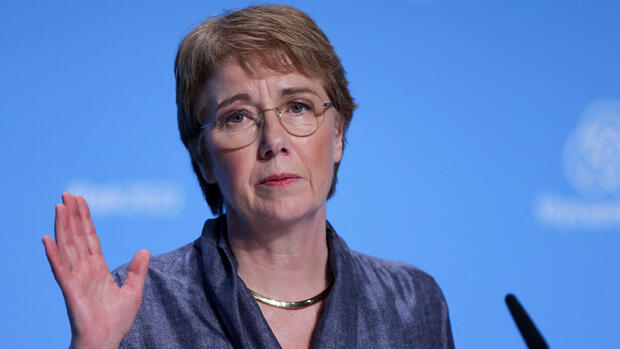The CEO has asked the Supervisory Board to terminate the contract.
(Photo: Reuters)
The fact that Martina Merz, the CEO of Thyssen-Krupp, had to go first shows one thing: how difficult it is to lead the industrial conglomerate. The diversity of the business areas is already problematic. In addition, the chronically financially weak company can hardly make the necessary investments on its own. The most important reason for the problems, however, lies in the group of shareholders, which is dominated by the Krupp Foundation.
Although the foundation is the largest shareholder of Thyssen-Krupp AG, it has not developed a strategy for the company with its more than 100,000 employees. The chairwoman of the foundation, Ursula Gather, only expects an appropriate dividend.
Gather gives the management a lot of freedom. However, without setting a clear course, the changing board members lack important orientation, as the Merz case shows. With her, the parts of the company were supposed to work side by side for themselves, practically every one of them was for sale.
Maximum uncertainty at Thyssen-Krupp
This caused a great deal of uncertainty in the company. The works council repeatedly put pressure on the public to finally develop a strategy. Vain. Merz didn’t want to, and the foundation remained silent. When the criticism from management increased, the supervisory board had to react.
Criticizing Merz’s strategic deficits does not go far enough. It more or less did what the major shareholder Krupp Foundation instructed it to do. Gather and her team should use the personnel as an opportunity to finally develop an idea of what should happen to Thyssen-Krupp.
>> Read also: Change of boss at Thyssen-Krupp – What to expect for the new CEO
Even Gather’s predecessor, Berthold Beitz, lacked a clear line, which is probably the main reason for Thyssen-Krupp’s current imbalance. As the savior of many Jewish people in the Second World War, Beitz is a moral authority whose rank there have been few in German history. As head of the foundation, however, he sinned against Thyssen-Krupp.
problem since the merger
The time since the merger of Krupp and Thyssen in 1999 has been marked by discussions about the future of the steel division and the question of who will be allowed to run the group. This cost the company and its employees strength and blocked their view of the essentials. What Thyssen-Krupp actually stands for has become secondary.
The companies Fresenius and Bosch, which are also controlled by foundations, show how things can be improved. Both companies have their issues, but they also have ownership that provides a framework for doing business.
If the Krupp Foundation is not willing to set clear guidelines, it should sell its stake in the group. Without a strategy, the substance of the traditional group will be consumed. Jobs are disappearing, shareholders are losing their money. The names Krupp and Thyssen would then be in line with AEG, Demag and Mannesmann. The Krupp Foundation in particular should have no interest in this.
More: Thyssen Krupp boss Martina Merz leaves – share collapses
